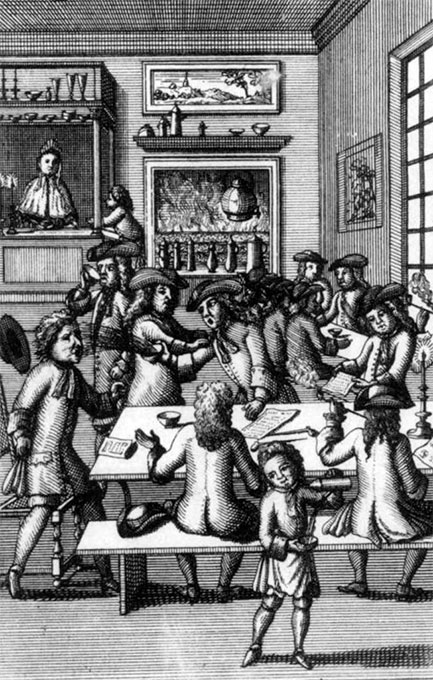Five things people used to think about coffee

Strange, inexplicable, funny but absolutely true coffee views from the old times.
Coffee has beena part of humanity for about 600 years - and until it became the most popular beverage in the world, it went through several stages. From its discovery by the Arabs to its spread in Europe and the rest of the planet, coffee has taken our place step by step. In the course of his career, however, it was confronted with perceptions that, while typical of their times and their limitations, today sound extremely strange to our ears - as well as funny at times.
We especially like to carve out the history of coffee - for this, here are five of the most bizarre coffee ideas, 100% true views, however outdated they may seem, have dominated public discourse for years, in distant times - or, not so much…
Five things people used to think about coffee.
 Coffee is the Devil's Drink: Coffee first arrived on European soil through the port of Venice, following the trade routes of the time. However, the strong Catholic tradition of Venice and the rest of the Italian cities in which the coffee was spread gave rise to a suspicion of the new beverage, which was of Muslim inspiration, of Arab origin and had an impact on human psyche. Coffee was considered foreign to European morals, unfit for Christians, and there were pressures for its official denunciation by the Catholic Church. However, Pope Clemens III enjoyed the taste of coffee so much that he had to baptize it with a formal "Christian drink" in order to suppress the reactions of his flock.
Coffee is the Devil's Drink: Coffee first arrived on European soil through the port of Venice, following the trade routes of the time. However, the strong Catholic tradition of Venice and the rest of the Italian cities in which the coffee was spread gave rise to a suspicion of the new beverage, which was of Muslim inspiration, of Arab origin and had an impact on human psyche. Coffee was considered foreign to European morals, unfit for Christians, and there were pressures for its official denunciation by the Catholic Church. However, Pope Clemens III enjoyed the taste of coffee so much that he had to baptize it with a formal "Christian drink" in order to suppress the reactions of his flock.
Coffee is not suitable for women: For many years, coffee has been a male privilege and a male drink. The main reason for this reality lies in the fact that coffee was served exclusively in coffee shops and never at home, from which women, according to the societal customs of the time, were outcasted , as in most aspects of social life. Based on this social reality, many people at the time firmly believed that coffee was not fit for consumption by women for medical reasons, linking it to fertility, menstruation and hysteria. After all, the consumption of coffee by women has for many years been regarded, with the morals of the time, as an example of loose morals, with all that it entails.
Coffee Destroys Families: The café environment, with its stormy conversations, the plethora of newspapers, and the free spirit, has since scandalized both detainees and conservatives alike. Already in the 17th century, a wave of alarmism accompanied the emergence of the first cafes in Europe, which would soon take the form of moral panic. The most well-known related text is the infamous "Women's Petition Against Coffee".
Written in 1674, the campaign complains that the husbands "do away with" and "neglect their marital duties", but also that by frequenting cafes and developing an interest in the public, they end up neglecting their homes and their families. Everything, the letter concludes, is about a "black, thick, bitter, dirty muddy water that turns your upper lip" - that is, coffee. Although many historians have argued that the text is fake or just a caustic satire, it fully reflects the prevailing social perception of the era for new coffee habits.
Coffee is aphrodisiac: In 18th-century brochures we read that coffee offers "vigorous erection", improves sperm fertility and composition, but also offers "spirituality" in erotic practice. Of course, coffee has no aphrodisiac effects nor does it help fertility, as modern medicine has shown. Such perceptions were given to 'colonial' products coming to Europe from faraway places and behind their proliferation underpinned by Orientalism - the 'lukewarm east' makes sense to bring an aphrodisiac drink to Europe.
Coffee is unhealthy: Because of its bitter taste, its effect on the central nervous system and the effect it has on those with stomach problems, coffee has been considered an unhealthy beverage for years. Today, however, scientists have evidence that coffee rich in antioxidants and has a preventative effect on a number of serious diseases, such as heart disease and several types of cancer, and it greatly helps memory and concentration. In the old conception of "unhealthy" coffee we must also take into account the fact that the conditions for cultivating, roasting, standardizing and storing coffee were clearly poorer than today, resulting in lower quality of coffee.
The perceptions of coffee are changing - nowadays we are definitely more and better informed, without prejudice. What has not changed in coffee is its unique, one of a kind taste.










